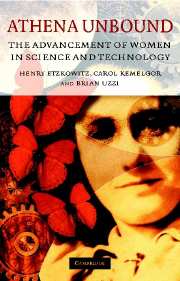Book contents
- Frontmatter
- Contents
- Acknowledgements
- Introduction: Women in science: Why so few?
- 1 The science career pipeline
- 2 Women and science: Athena Bound
- 3 Gender, sex and science
- 4 Selective access
- 5 Critical transitions in the graduate and post-graduate career path
- 6 Women's (and men's) graduate experience in science
- 7 The paradox of critical mass for women in science
- 8 The ‘kula ring’ of scientific success
- 9 Women's faculty experience
- 10 Dual male and female worlds of science
- 11 Differences between women in science
- 12 Social capital and faculty network relationships
- 13 Negative and positive departmental cultures
- 14 Initiatives for departmental change
- 15 International comparisons
- 16 Athena Unbound: Policy for women in science
- Appendix
- Bibliography
- Index
8 - The ‘kula ring’ of scientific success
Published online by Cambridge University Press: 08 September 2009
- Frontmatter
- Contents
- Acknowledgements
- Introduction: Women in science: Why so few?
- 1 The science career pipeline
- 2 Women and science: Athena Bound
- 3 Gender, sex and science
- 4 Selective access
- 5 Critical transitions in the graduate and post-graduate career path
- 6 Women's (and men's) graduate experience in science
- 7 The paradox of critical mass for women in science
- 8 The ‘kula ring’ of scientific success
- 9 Women's faculty experience
- 10 Dual male and female worlds of science
- 11 Differences between women in science
- 12 Social capital and faculty network relationships
- 13 Negative and positive departmental cultures
- 14 Initiatives for departmental change
- 15 International comparisons
- 16 Athena Unbound: Policy for women in science
- Appendix
- Bibliography
- Index
Summary
Elite male participants in a cultural complex extending from the Kwakiutl Native American communities in the Pacific Northwest to the Trobriand Islands in the South Pacific regularly meet to give away their most prized possessions to each other. The more material goods an individual gives away, the higher their social status and the more secure their standing within the group. This pattern of social relations, called the ‘kula ring’ in Melanesia and the ‘potlatch’ in North America, provides an informal means of organizing and redistributing resources and power in the community (Drucker and Heizer, 1967). ‘And it is just through this exchange, through their being constantly within reach and the object of competitive desire, through being the means of arousing envy and conferring social distinction and renown, that these objects attain their high value’ (Malinowski, 1922: 511).
Conducted at regular intervals, the kula ring has its analog in the way scientists exchange ideas, resources, and information. Like gatherings of Melanesian clan leaders, elite scientists who are linked by ongoing networks of relations and governed by norms of trust and reciprocity ritualistically meet to discuss collaborations, discover complementary areas of research, and introduce their graduate students and post-doctoral fellows to each other for future correspondence and employment.
Even members of the same department may experience the scientific world quite differently, depending on the configuration of their social networks.
- Type
- Chapter
- Information
- Athena UnboundThe Advancement of Women in Science and Technology, pp. 115 - 130Publisher: Cambridge University PressPrint publication year: 2000



